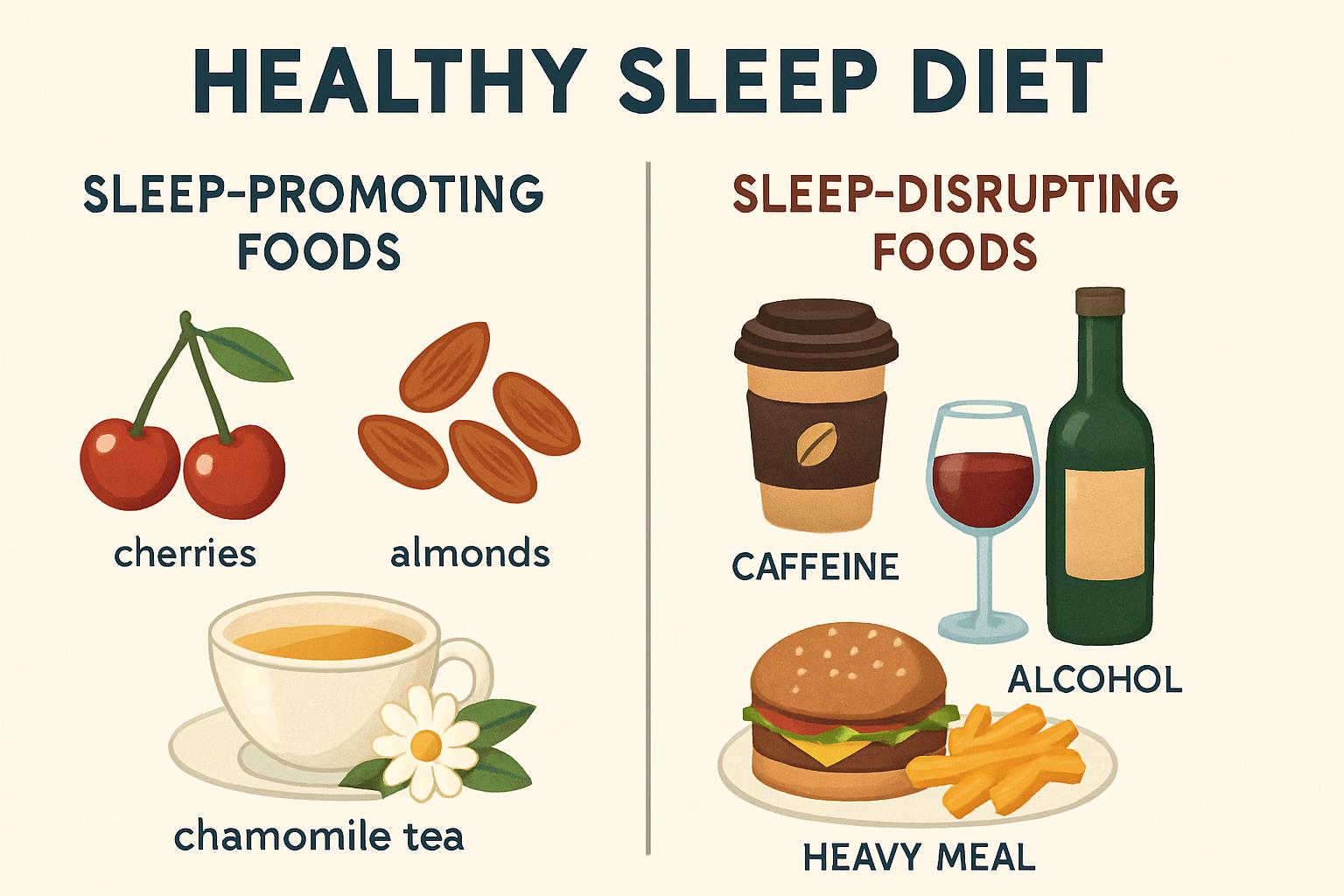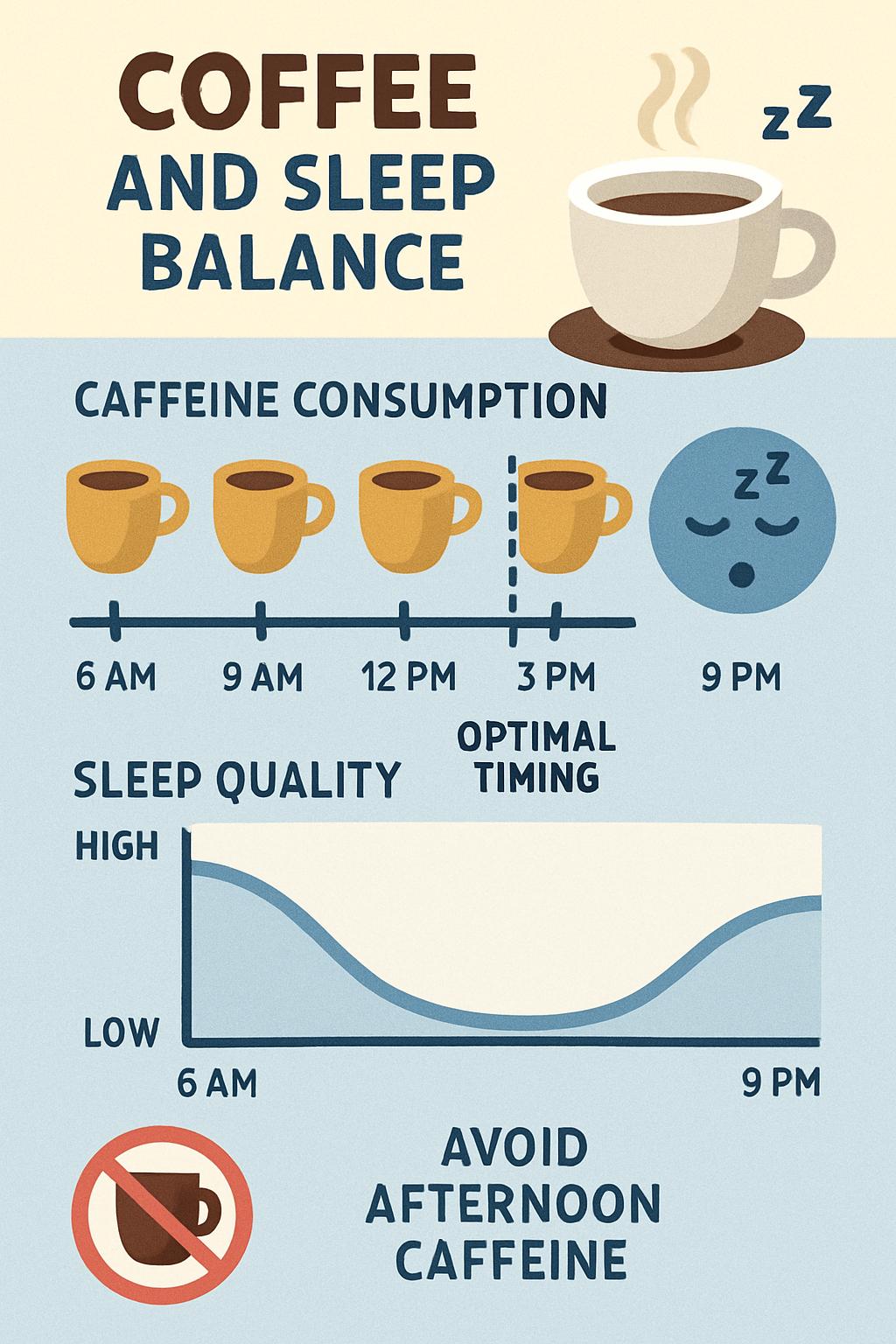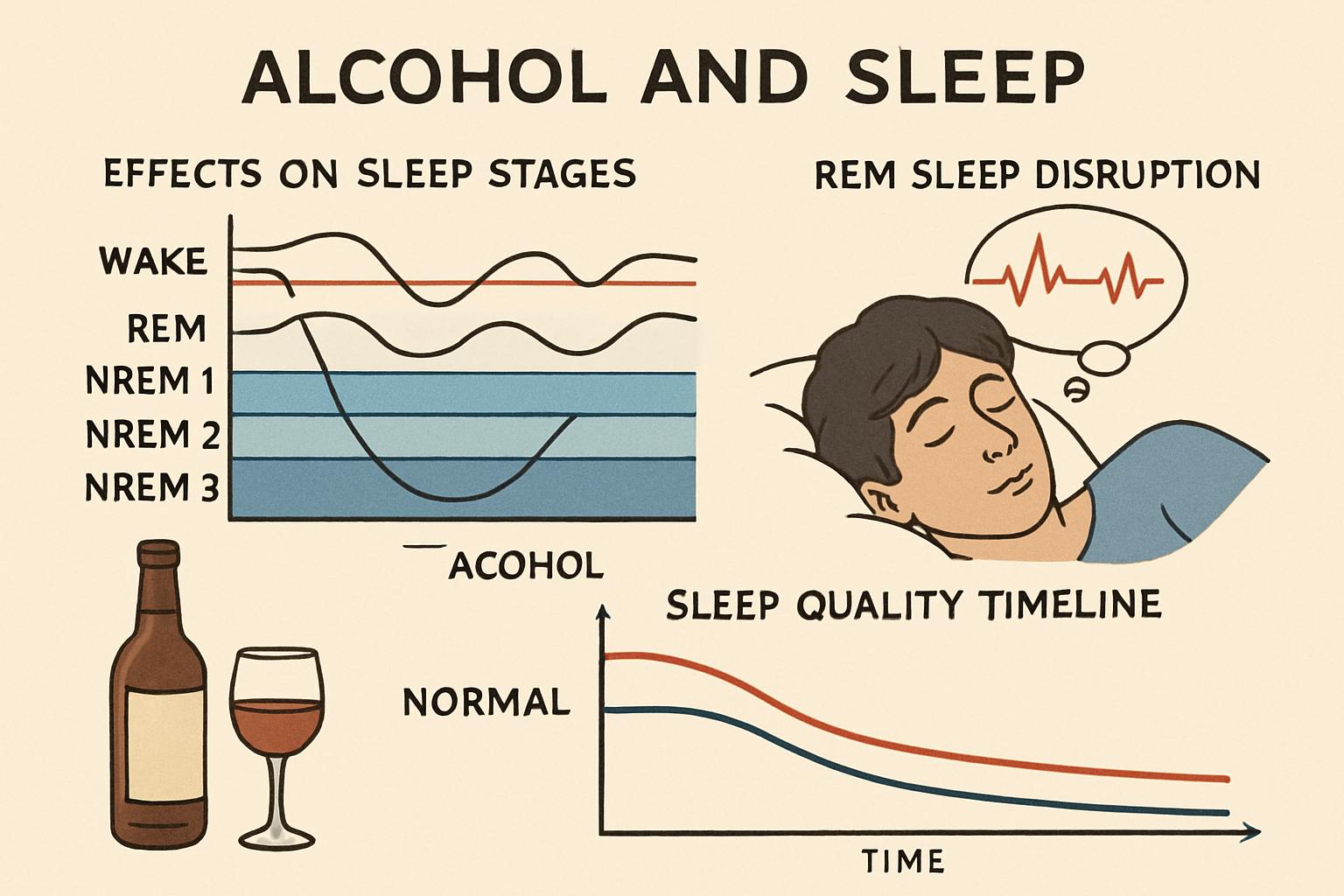
Medical Disclaimer: This article provides educational information about nutrition and sleep. Always consult with healthcare professionals for proper diagnosis and treatment of medical conditions.
The Nutrition-Sleep Connection
What you eat and when you eat it significantly impacts your sleep quality and duration. Your digestive system operates on its own circadian rhythm, and meal timing can either support or disrupt your natural sleep-wake cycle. Understanding the complex relationship between nutrition and sleep empowers you to make dietary choices that enhance rather than hinder your rest.
Research from the Sleep Foundation shows that both macronutrient composition and meal timing affect sleep onset, sleep architecture, and morning alertness. Strategic nutrition choices can reduce the time it takes to fall asleep by up to 37% and improve overall sleep quality significantly.
Nutrition Impact: Studies demonstrate that people who follow sleep-supporting nutrition guidelines fall asleep 14 minutes faster and experience 23% better sleep quality compared to those with poor dietary habits. The timing of your last meal can affect sleep onset by up to 60 minutes.
Meal Timing and Circadian Rhythms
Your digestive system has its own internal clock that can influence your master circadian rhythm. Eating at consistent times helps reinforce healthy sleep-wake cycles, while irregular meal patterns can disrupt sleep quality.
Optimal Meal Timing for Sleep
- Last Meal: Finish eating 3-4 hours before bedtime to allow for digestion
- Heavy Meals: Avoid large or rich meals within 4 hours of sleep
- Consistent Schedule: Eat meals at the same times daily to support circadian rhythm
- Time-Restricted Eating: Consume all calories within a 10-12 hour window
Why Late Eating Disrupts Sleep
- Core Body Temperature: Digestion raises body temperature when it should be cooling for sleep
- Insulin Response: Late-night eating causes insulin spikes that can interfere with melatonin
- Gastric Discomfort: Lying down with food in stomach can cause reflux and discomfort
- Metabolic Confusion: Eating when metabolism should be slowing disrupts natural rhythms
Sleep-Promoting Nutrients
Certain nutrients have been scientifically proven to support better sleep through various mechanisms, from neurotransmitter production to muscle relaxation.
Tryptophan: The Sleep Amino Acid
Tryptophan is an essential amino acid that serves as a precursor to serotonin and melatonin, both crucial for sleep regulation.
Best Tryptophan Sources
- Turkey: 250-300mg per 3oz serving
- Milk and Dairy: Natural source with calcium benefits
- Eggs: Complete protein with sleep-supporting nutrients
- Fish: Salmon, tuna, and halibut are excellent sources
- Nuts and Seeds: Pumpkin seeds, sesame seeds, walnuts
- Legumes: Chickpeas, lentils, and soybeans
Maximizing Tryptophan Effectiveness
- Combine with complex carbohydrates to enhance brain uptake
- Consume 1-2 hours before bedtime for optimal timing
- Avoid competing amino acids from high-protein meals
- Include magnesium-rich foods to support conversion to serotonin
Magnesium: The Relaxation Mineral
Magnesium supports over 300 enzymatic reactions and plays a crucial role in muscle relaxation and nervous system regulation.
Magnesium's Sleep Benefits
- Muscle Relaxation: Reduces physical tension and restless legs
- GABA Support: Enhances calming neurotransmitter function
- Cortisol Regulation: Helps manage stress hormone levels
- Melatonin Production: Supports natural sleep hormone synthesis
Top Magnesium-Rich Foods
- Dark Leafy Greens: Spinach, Swiss chard, kale
- Nuts and Seeds: Almonds, pumpkin seeds, sunflower seeds
- Whole Grains: Brown rice, quinoa, oats
- Legumes: Black beans, chickpeas, lentils
- Dark Chocolate: 70% cacao or higher
- Avocados: Rich in magnesium and healthy fats

Complex Carbohydrates: Sleep's Best Friend
Complex carbohydrates support sleep by facilitating tryptophan uptake in the brain and promoting stable blood sugar levels throughout the night.
Sleep-Supporting Carbohydrates
- Oats: Rich in melatonin and complex carbs
- Sweet Potatoes: Provide potassium and complex carbohydrates
- Brown Rice: Contains GABA and supports serotonin production
- Quinoa: Complete protein with sleep-supporting amino acids
- Whole Grain Bread: Provides steady glucose release
Optimal Carbohydrate Timing
- Include complex carbs in dinner but avoid simple sugars
- Combine with protein for sustained blood sugar
- Avoid high-glycemic foods that cause blood sugar spikes
- Consider a small carbohydrate snack 1-2 hours before bed
Sleep-Disrupting Foods and Substances
Just as certain foods promote sleep, others can significantly interfere with your ability to fall asleep and maintain quality rest throughout the night.
Caffeine: The Sleep Saboteur
Caffeine has a half-life of 5-7 hours, meaning it can affect sleep even when consumed many hours before bedtime.
Caffeine Guidelines for Better Sleep
- Cutoff Time: No caffeine after 2 PM for most people
- Individual Sensitivity: Some people need to stop by noon
- Hidden Sources: Chocolate, tea, some medications contain caffeine
- Withdrawal Effects: Gradual reduction prevents rebound fatigue
Common Caffeine Sources
- Coffee: 95mg per 8oz cup
- Black Tea: 47mg per 8oz cup
- Green Tea: 28mg per 8oz cup
- Dark Chocolate: 12mg per ounce
- Energy Drinks: 50-300mg per serving
Alcohol: The False Sleep Aid
While alcohol may initially make you feel drowsy, it significantly disrupts sleep architecture and quality.
How Alcohol Affects Sleep
- REM Suppression: Reduces crucial REM sleep phases
- Sleep Fragmentation: Causes frequent awakenings
- Dehydration: Leads to early morning awakening
- Rebound Effect: Sleep becomes more disrupted as alcohol metabolizes
Alcohol and Sleep Guidelines
- Limit alcohol to 1-2 drinks maximum
- Finish drinking at least 3 hours before bedtime
- Hydrate with water between alcoholic beverages
- Avoid alcohol if you have sleep disorders
Foods That Disrupt Sleep
- Spicy Foods: Can cause heartburn and raise body temperature
- High-Fat Foods: Take more energy to digest and can cause discomfort
- Simple Sugars: Cause blood sugar spikes and crashes
- Processed Foods: Often high in sodium and artificial additives
- Large Portions: Require significant digestive energy
Timing Tip: Research shows that eating a high-fat meal within 4 hours of bedtime can delay sleep onset by an average of 84 minutes and reduce sleep efficiency by 15%. Plan your heaviest meals earlier in the day for optimal sleep.
Strategic Bedtime Snacking
When chosen carefully, a small bedtime snack can actually support better sleep by preventing hunger-related awakenings and providing sleep-promoting nutrients.
Ideal Bedtime Snack Characteristics
- Small Portion: 100-200 calories maximum
- Balanced Composition: Combination of protein and complex carbs
- Easy to Digest: Gentle on the stomach
- Sleep-Promoting: Contains tryptophan, magnesium, or melatonin
Best Bedtime Snack Options
- Greek Yogurt with Berries: Protein, probiotics, and antioxidants
- Banana with Almond Butter: Potassium, magnesium, and healthy fats
- Whole Grain Crackers with Turkey: Complex carbs and tryptophan
- Tart Cherry Juice: Natural source of melatonin
- Oatmeal with Cinnamon: Complex carbs and blood sugar stability
- Herbal Tea with Honey: Relaxation and gentle carbohydrates
Snacks to Avoid Before Bed
- Ice cream or high-sugar desserts
- Spicy or heavily seasoned foods
- Large portions of any food
- Caffeinated beverages or foods
- High-sodium snacks that increase thirst

Hydration and Sleep Quality
Proper hydration supports sleep, but the timing of fluid intake is crucial to avoid sleep disruptions from nighttime bathroom trips.
Hydration Strategy for Better Sleep
- Daily Goal: Aim for 8-10 glasses of water throughout the day
- Front-Loading: Drink most fluids earlier in the day
- Evening Taper: Reduce fluid intake 2-3 hours before bedtime
- Quality Matters: Choose water over sugary or caffeinated beverages
Sleep-Supporting Beverages
- Chamomile Tea: Contains apigenin, which promotes sleepiness
- Passionflower Tea: Reduces anxiety and promotes relaxation
- Valerian Root Tea: Natural sedative properties
- Warm Milk: Contains tryptophan and calcium
- Tart Cherry Juice: Natural source of melatonin
Supplements for Sleep Support
While whole foods should be the primary source of sleep-supporting nutrients, certain supplements can provide additional benefits when used appropriately.
Evidence-Based Sleep Supplements
- Melatonin: 0.5-3mg, 30 minutes before desired sleep time
- Magnesium: 200-400mg, preferably magnesium glycinate
- L-Theanine: 100-200mg for relaxation without sedation
- GABA: 500-750mg to support calming neurotransmitter
- Glycine: 3g to support deep sleep and body temperature regulation
Supplement Safety Guidelines
- Consult healthcare providers before starting any supplements
- Start with the lowest effective dose
- Be aware of potential interactions with medications
- Choose third-party tested products for quality assurance
- Monitor effects and adjust timing or dosage as needed
Natural First: While supplements can be helpful, focus on getting sleep-supporting nutrients from whole foods first. A balanced diet with strategic timing provides the foundation for optimal sleep, with supplements serving as targeted support when needed.
Creating Your Sleep Nutrition Plan
Developing a personalized nutrition strategy for better sleep requires understanding your individual needs, schedule, and preferences.
Assessment Areas
- Current Diet: Evaluate your typical eating patterns and timing
- Sleep Challenges: Identify specific sleep issues nutrition might address
- Lifestyle Factors: Consider work schedule, family meals, and social eating
- Food Sensitivities: Account for allergies or digestive issues
- Budget and Access: Plan within your means and local food availability
Implementation Strategy
- Gradual Changes: Implement one or two changes at a time
- Meal Planning: Prepare sleep-supporting meals and snacks in advance
- Timing Focus: Prioritize meal timing before making major dietary changes
- Track Progress: Monitor how dietary changes affect your sleep quality
- Flexibility: Adjust the plan based on results and life circumstances
Sample Daily Eating Schedule
- 7:00 AM: Balanced breakfast with protein and complex carbs
- 10:00 AM: Mid-morning snack if needed
- 12:30 PM: Lunch with lean protein and vegetables
- 3:30 PM: Afternoon snack with nuts or fruit
- 6:30 PM: Dinner with sleep-supporting foods
- 8:30 PM: Optional small bedtime snack
- 10:00 PM: Herbal tea if desired
Special Dietary Considerations
Different dietary patterns and restrictions require adapted approaches to sleep-supporting nutrition.
Vegetarian and Vegan Sleep Nutrition
- Protein Sources: Combine legumes, nuts, and seeds for complete amino acids
- B12 Supplementation: Important for nervous system function
- Iron Absorption: Combine iron-rich foods with vitamin C
- Magnesium Focus: Emphasize nuts, seeds, and leafy greens
Low-Carb and Ketogenic Diets
- Electrolyte Balance: Maintain adequate sodium, potassium, and magnesium
- Timing Adjustments: May need longer adaptation period for sleep
- Fat Quality: Choose omega-3 rich fats for anti-inflammatory benefits
- Micronutrient Attention: Ensure adequate B-vitamins and minerals
Food Allergies and Sensitivities
- Identify alternative sources of sleep-supporting nutrients
- Be aware that food sensitivities can disrupt sleep
- Consider elimination diets to identify problem foods
- Work with healthcare providers for severe allergies